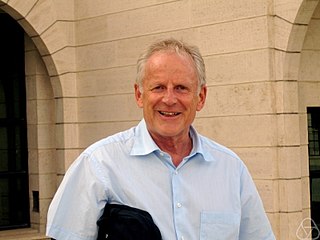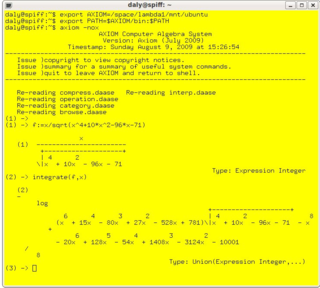Axiom is a free, general-purpose computer algebra system. It consists of an interpreter environment, a compiler and a library, which defines a strongly typed hierarchy.
In the theory of multivariate polynomials, Buchberger's algorithm is a method for transforming a given set of polynomials into a Gröbner basis, which is another set of polynomials that have the same common zeros and are more convenient for extracting information on these common zeros. It was introduced by Bruno Buchberger simultaneously with the definition of Gröbner bases.

Bruno Buchberger is Professor of Computer Mathematics at Johannes Kepler University in Linz, Austria. In his 1965 Ph.D. thesis, he created the theory of Gröbner bases, and has developed this theory throughout his career. He named these objects after his advisor Wolfgang Gröbner. Since 1995, he has been active in the Theorema project at the University of Linz.
ALTRAN is a programming language for the formal manipulation of rational functions of several variables with integer coefficients. It was developed at Bell Labs in 1960s. ALTRAN is a FORTRAN version of ALPAK rational algebra package, and “can be thought of as a variant of FORTRAN with the addition of an extra declaration, the ‘algebraic’ type declaration.”

SageMath is a computer algebra system (CAS) with features covering many aspects of mathematics, including algebra, combinatorics, graph theory, group theory, differentiable manifolds, numerical analysis, number theory, calculus and statistics.
Symbolic Manipulation Program, usually called SMP, was a computer algebra system designed by Chris A. Cole and Stephen Wolfram at Caltech circa 1979. It was initially developed in the Caltech physics department with contributions from Geoffrey C. Fox, Jeffrey M. Greif, Eric D. Mjolsness, Larry J. Romans, Timothy Shaw, and Anthony E. Terrano.
Jean-Charles Faugère is the head of the POLSYS project-team of the Laboratoire d'Informatique de Paris 6 (LIP6) and Paris–Rocquencourt center of INRIA, in Paris. The team was formerly known as SPIRAL and SALSA.
ACM Transactions on Mathematical Software (TOMS) is a quarterly scientific journal that aims to disseminate the latest findings of note in the field of numeric, symbolic, algebraic, and geometric computing applications.
MATHLAB is a computer algebra system created in 1964 by Carl Engelman at MITRE and written in Lisp.
In mathematics and computer science, symbolic-numeric computation is the use of software that combines symbolic and numeric methods to solve problems.

In mathematics and computer science, computer algebra, also called symbolic computation or algebraic computation, is a scientific area that refers to the study and development of algorithms and software for manipulating mathematical expressions and other mathematical objects. Although computer algebra could be considered a subfield of scientific computing, they are generally considered as distinct fields because scientific computing is usually based on numerical computation with approximate floating point numbers, while symbolic computation emphasizes exact computation with expressions containing variables that have no given value and are manipulated as symbols.
In computer algebra, a regular semi-algebraic system is a particular kind of triangular system of multivariate polynomials over a real closed field.
Daniel Lazard is a French mathematician and computer scientist. He is emeritus professor at Pierre and Marie Curie University.
Cambridge Algebra System (CAMAL) is a computer algebra system written in Cambridge University by David Barton, Steve Bourne, and John Fitch. It was initially used for computations in celestial mechanics and general relativity. The foundation code was written in Titan computer assembler. In 1973, when Titan was replaced with an IBM370/85, it was rewritten in ALGOL 68C and then BCPL where it could run on IBM mainframes and assorted microcomputers.
ISSAC, the International Symposium on Symbolic and Algebraic Computation, is an academic conference in the field of computer algebra. ISSAC has been organized annually since 1988, typically in July. The conference is regularly sponsored by the Association for Computing Machinery special interest group SIGSAM, and the proceedings since 1989 have been published by ACM. ISSAC is considered as being one of the most influential conferences for the publication of scientific computing research.
FGLM is one of the main algorithms in computer algebra, named after its designers, Faugère, Gianni, Lazard and Mora. They introduced their algorithm in 1993. The input of the algorithm is a Gröbner basis of a zero-dimensional ideal in the ring of polynomials over a field with respect to a monomial order and a second monomial order. As its output, it returns a Gröbner basis of the ideal with respect to the second ordering. The algorithm is a fundamental tool in computer algebra and has been implemented in most of the computer algebra systems. The complexity of FGLM is O(nD3), where n is the number of variables of the polynomials and D is the degree of the ideal. There are several generalization and various applications for FGLM.
Ferdinando 'Teo' Mora is an Italian mathematician, and since 1990 until 2019 a professor of algebra at the University of Genoa.

Mark Giesbrecht is a Canadian computer scientist who is the 12th dean of the University of Waterloo’s Faculty of Mathematics, starting from July 1, 2020. He was the Director of the David R. Cheriton School of Computer Science at the University of Waterloo, Canada from July 2014 until June 2020.
In mathematics, a sparse polynomial is a polynomial that has far fewer terms than its degree and number of variables would suggest. For example, is a sparse polynomial as it is a trinomial with a degree of .
Deepak Kapur is a Distinguished Professor in the Department of Computer Science at the University of New Mexico.



